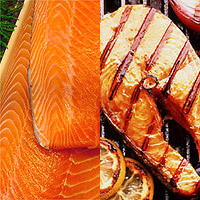Penn Herb Wellness Guide
Salmon

Preparation, Uses, & Tips
For all conventional cooking methods, first measure the salmon at its thickest point, including stuffing if used. For each inch (about 2.5cm) thickness, cook at high heat 10 minutes if fresh or fully thawed; 12 to 15 minutes if partially thawed; 20 minutes if solidly frozen. Add 5 minutes to total cooking time if the salmon is foil-wrapped or heavily sauced. The secret to successful salmon cookery is to not overcook it. Whichever of the following cooking methods you choose, your salmon will be cooked when its flesh becomes opaque, yet is still moist on the inside.
Baking
Place salmon in a greased baking dish (or wrap in oiled foil and place on a baking sheet). Brush with melted butter or oil and season with salt and pepper. Bake in a preheated 450F (230C) oven.
Barbecuing
Place marinated salmon over hot coals on a well-oiled grill. Baste frequently and turn once halfway through cooking period. Because salmon is lean compared to other protein foods, it does not exude a lot of self-basting fat. Be sure all grills, baskets, racks, foil, and other utensils are well-oiled to ensure easy handling of salmon while barbecuing. Marinating and frequent basting will keep salmon moist and flavorful.
Broiling
Place seasoned and/or marinated salmon on a well-greased broiler pan. If using fillets, fold thin ends under to ensure even cooking. Broil under a preheated broiler 4 to 5 inches (about 10 to 12.5cm) from heat.
Pan frying
Coat salmon with seasoned flour or crumbs and fry in a small amount of hot butter or oil, turning once halfway through cooking time.
Poaching
Bring poaching liquid, consisting of water, broth, and herbs and spices, to a simmer. Slip in salmon, then cover pan and keep liquid at a simmer for about 8 minutes per inch (about 2.5cm) of thickness of the fish.
Steaming
Place salmon on a greased perforated rack over 1 to 2 inches (2.5 to 5cm) of rapidly boiling water. Cover with a tight-fitting lid and keep the water at a constant boil through cooking time.
Stir-frying
Cut salmon steaks or fillets into bite-sized pieces. Coat with cornstarch and stir-fry gently and briefly in hot oil before adding to your favorite stir-fried vegetables.
Copyright 2025 TraceGains, Inc. All rights reserved.
Learn more about TraceGains, the company.
The information presented in the Food Guide is for informational purposes only and was created by a team of USregistered dietitians and food experts. Consult your doctor, practitioner, and/or pharmacist for any health problem and before using any supplements, making dietary changes, or before making any changes in prescribed medications. Information expires December 2025.


